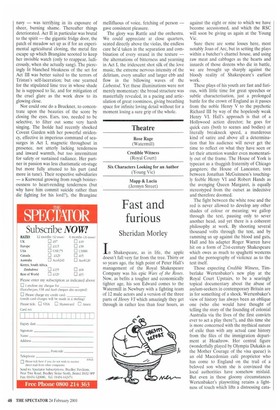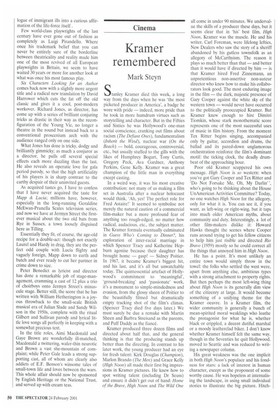Rose Rage (Watermill) Credible Witness (Royal Court) Six Characters Looking for an Author (Young Vic) Mapp & Lucia (Jermyn Street)
Fast and furious
Sheridan Morley
In Shakespeare, as in life, the apple doesn't fall very far from the tree. Thirty or so years ago, the high point of Peter Hall's management of the Royal Shakespeare Company was his epic Wars of the Roses. Now, as befits a tougher and economically tighter age, his son Edward comes to the Watermill in Newbury with a fighting team of 12 male actors and a version of the three parts of Henry VI which amazingly they get through in rather less than four hours, as
against the eight or nine to which we have become accustomed, and which the RSC will soon be giving us again at the Young Vic.
Sure there are some losses here, most notably Joan of Arc, but in setting the plays within a butcher's charnel house, and using raw meat and cabbages as the hearts and innards of those dozens who die in battle, we are brought up sharply against the bloody reality of Shakespeare's earliest work.
These plays of his youth are fast and furious, with little time for great speeches or subtle characterisation, just a prolonged battle for the crown of England as it passes from the noble Henry V to the psychotic Richard III by way of the hopelessly weak Henry VI. Hall's approach is that of a Hollywood action director; he goes for quick cuts (both to scenes and bodies) at literally breakneck speed, a murderous kind of satire and above all a determination that his audience will never get the time to reflect on what they have seen or let their attention wander even momentarily out of the frame. The House of York is typecast as a thuggish fraternity of Chicago gangsters; the House of Lancaster, torn between Jonathan McGuinness's touchingly feeble Henry VI and Robert Hands as the avenging Queen Margaret, is equally stereotyped from the outset as indecisive and therefore doomed.
The fight between the white rose and the red is never allowed to develop any other shades of colour or meaning; we gallop through the text, pausing only to sever another head, and yet there is a coherent philosophy at work. By shooting several thousand volts through the text, and by ramming us up against the blood and guts, Hall and his adapter Roger Warren have hit on a form of 21st-century Shakespeare which owes as much to spaghetti westerns and the pornography of violence as to the text itself.
Those expecting Credible Witness, Timberlake Wertenbaker's new play at the Royal Court Upstairs, to be a searingly topical documentary about the abuse of asylum-seekers in contemporary Britain are in for something of a shock. Wertenbaker's view of history has always been an oblique one (who else would have thought of telling the story of the founding of colonial Australia via the lives of the first convicts ever to act a play there?), and this time she is more concerned with the mythical nature of exile than with any actual case history from the files of the immigration department at Heathrow. Her central figure (wonderfully played by Olympia Dukakis as the Mother Courage of the visa queue) is an old Macedonian café proprietor who has come to England on the trail of a beloved son whom she is convinced the local authorities have somehow mislaid. But even in these gloomy circumstances Wertenbaker's playwriting retains a lightness of touch which lifts a distressing cata
logue of immigrant ills into a curious affirmation of the life-force itself.
Few world-class playwrights of the last century have ever gone out of fashion as completely as Luigi Pirandello. Where once his trademark belief that you can never be entirely sure of the borderline between theatricality and reality made him one of the most revived of all European playwrights in Britain, we seem to have waited 30 years or more for another look at what was once his most famous play.
Six Characters Looking for an Author comes back now with a slightly more urgent title and a radical new translation by David Harrower which cuts the fat off the old classic and gives it a cool, post-modern workover. Richard Jones, as director, has come up with a series of brilliant conjuring tricks as drastic in their way as the reconfiguration of the Young Vic, no longer a theatre in the round but instead back to a conventional proscenium arch with the audience ranged only on one side.
What Jones has done is tricky, dodgy and brilliantly gimmicky; as much a conjuror as a director, he pulls off several special effects each more dazzling than the last. He also reveals an operatic love for gala period parody, so that the high artificiality of his players is in sharp contrast to the earthy despair of their uninvited guests.
As acquired tastes go, I have to confess that I have never acquired the taste for Mapp & Lucia; millions have, however, especially in the long-running Geraldine McEwan-Prunella Scales television series, and now we have at Jermyn Street the firstever musical about the two old bats from Rye in Sussex, a town loosely disguised here as Tilling.
Essentially they fit, of course, the age-old recipe for a double-act: though not exactly Laurel and Hardy in drag, they are the perfect odd couple with Lucia flighty and vaguely foreign, Mapp down to earth and butch and ever ready to cut her partner in crime down to size.
Peter Benedict as lyricist and director has done a remarkable job of stage-management, cramming a cast of 12 plus a trio of choirboys onto Jermyn Street's minuscule stage. Better still, the score that he has written with William Hetherington is a joyous throwback to the small-scale British musical era of Julian Slade and Sandy Wilson in the 1950s, complete with the ritual Gilbert and Sullivan parody and lyrical little love songs all perfectly in keeping with a somewhat precious text.
In the title roles, Aimi Macdonald and Gaye Brown are wonderfully ill-matched, Macdonald a twittering, wafer-thin neurotic and Brown a vast she-mountain of complaint; while Peter Gale leads a strong supporting cast, all of whom are clearly also addicts of E.F. Benson's winsome tales of small-town life and loves between the wars. This whole affair should now be sponsored by English Heritage or the National Trust, and served up with cream teas.



































































 Previous page
Previous page